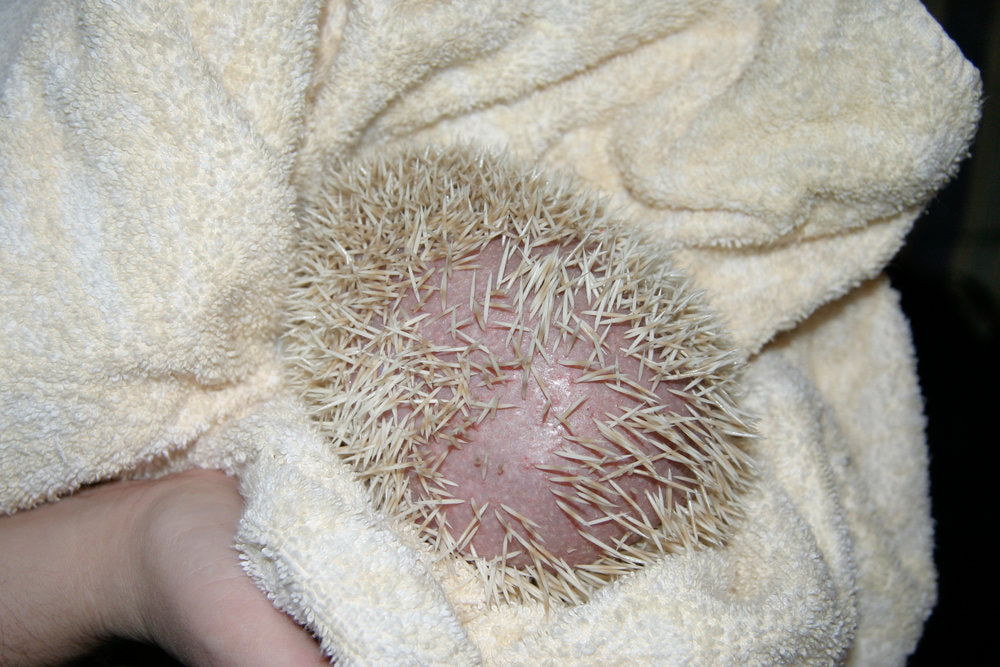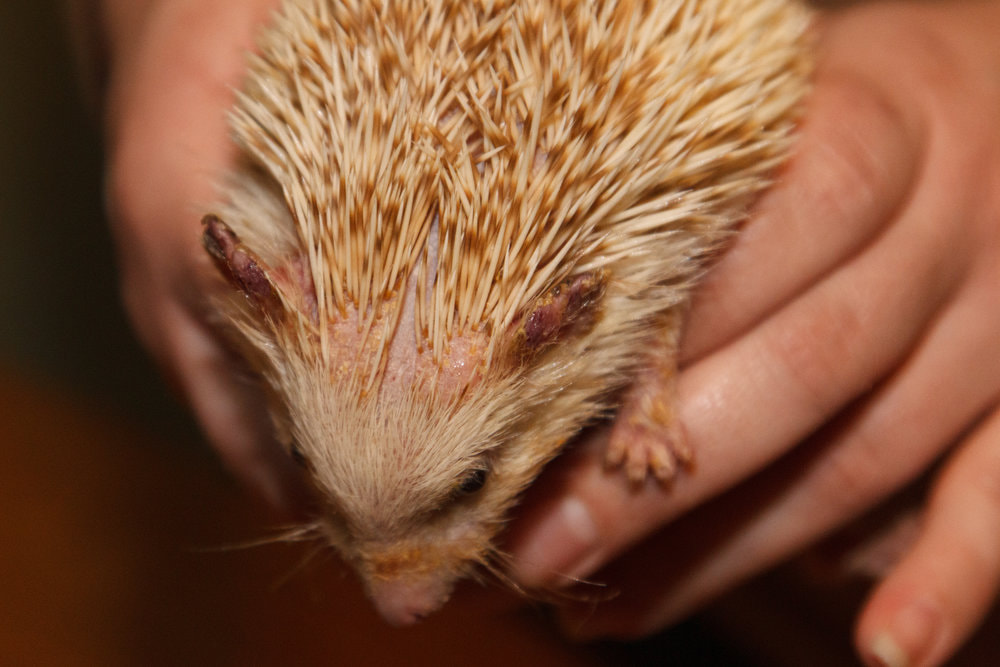Hedgehogs and Mites
 Pictures borrowed from https://www.hamorhollow.com/articles/oh-no-does-my-hedgehog-have-mites
Pictures borrowed from https://www.hamorhollow.com/articles/oh-no-does-my-hedgehog-have-mites
Mites...what are they?
Mites are tiny parasites, which are arachnids similar to tiny spiders or ticks. There are several species of mites which can infect hedgehogs, including chorioptic, sarcoptic, demodectic, psoroptic. They cause skin irritation and pain to your hedgehog, though to different degrees depending on the type of mite.
How Common are Mites?
We have raised hedgehogs for nearly 6 1/2 years and (knock on wood) we have never had mites. I believe this is partially because we never use wood shavings, we practice excellent sanitation and sterilization, we quarantine any new hedgehogs that we adopt from other breeders, and we pay close attention to the health and well being of our herd!
Types of Mites
Chorioptic mites are the most common mites to affect hedgehogs. They are generally oval in shape, and white, gray, or similar light color. Typically they will cause rough, patchy skin in your pet hedgehog, with some scabbing as well. This kind of mite is not generally transmissible to humans.
Sarcoptic mites can affect dogs, cats, and hedgehogs. This kind can sometimes affect humans, more so than other types, and typically causes what is known as scabies. It typically causes skin irritation comparable to an allergic reaction. These mites can be very small and hard to find.
Demodectic mites have more of an oblong shape. They tend to live off of oil glands and hair follicles, and many animals (including humans) may carry around some demodectic mites of varying types as part of the normal, healthy skin biome. Generally, this kind of mite doesn’t cause any noticeable problems unless a hedgehog, human, or other animal has an immune deficiency of some kind.
Psoroptic mites are the most serious form, and are known as scabbing mites. Rather than burrowing into the skin, as sarcoptic mites do, they find existing scabs and other skin imperfections and reproduce underneath the protection it provides. Fortunately, they are most common in livestock animals, and far less common in household pets, including hedgehogs.
Where do mites come from?
Mites can be transferred from an outside source such as an infested bag of food, shavings, or directly from another hedgehog. Ideally if you were to adopt a hedgehog in the future, it is best to quarantine them in a separate area of your home until they can be vet checked and deemed healthy (and mite free).
How can I prevent mites?
Preventing mites is fairly easy to do. I would strongly suggest NOT USING any type of wood shavings in your hedgehog's cage. I personally HATE wood shavings for several reasons; mites are likely to live in this bedding, wood shavings are extremely dusty and can dry out your hedgehog's skin and cause upper respiratory infections. If you do decide to use bedding, Carefresh is an excellent choice or recycle paper bedding works well too! It may be a little more expensive in comparison to wood shavings, but it is so much healthier for the hedgies.
Sometimes mites can live in paper bedding. I would recommend freezing all bedding and packaged food after you purchase it for 24 hours before putting it in the cage with your hedgehog. The cold temperature is highly likely to kill any mites if there are any living in the bedding.
How do I treat mites?
Althought there is not a specific mite treatment solely for hedgehogs, your vet may prescribe Revolution that is made for cats or kittens. Spruce Pets recommends avoiding any medication without vet approval, as hedgehogs respond badly to some treatments intended for cats and dogs. In particular avoid mite collars, permethrin sprays or permethrin spot-ons, as these can be lethal to your pet.
TOXIC AND FATAL REACTIONS
Do not treat the mite infestation with Ivermectin injections as many hedgehogs have had toxic reactions due to overdose which may lead to death. Not all vets are aware of this particular overdose risk so I would strongly encourage people to request using Revolution as a safe way to treat mites.
***Please use caution and speak to your exotic vet BEFORE applying any mite prevention or beginning mite treatment. Some at home treatments or in store flea/tick medications can be lethal to your hedgehog and possibly kill them.
Mites are tiny parasites, which are arachnids similar to tiny spiders or ticks. There are several species of mites which can infect hedgehogs, including chorioptic, sarcoptic, demodectic, psoroptic. They cause skin irritation and pain to your hedgehog, though to different degrees depending on the type of mite.
How Common are Mites?
We have raised hedgehogs for nearly 6 1/2 years and (knock on wood) we have never had mites. I believe this is partially because we never use wood shavings, we practice excellent sanitation and sterilization, we quarantine any new hedgehogs that we adopt from other breeders, and we pay close attention to the health and well being of our herd!
Types of Mites
Chorioptic mites are the most common mites to affect hedgehogs. They are generally oval in shape, and white, gray, or similar light color. Typically they will cause rough, patchy skin in your pet hedgehog, with some scabbing as well. This kind of mite is not generally transmissible to humans.
Sarcoptic mites can affect dogs, cats, and hedgehogs. This kind can sometimes affect humans, more so than other types, and typically causes what is known as scabies. It typically causes skin irritation comparable to an allergic reaction. These mites can be very small and hard to find.
Demodectic mites have more of an oblong shape. They tend to live off of oil glands and hair follicles, and many animals (including humans) may carry around some demodectic mites of varying types as part of the normal, healthy skin biome. Generally, this kind of mite doesn’t cause any noticeable problems unless a hedgehog, human, or other animal has an immune deficiency of some kind.
Psoroptic mites are the most serious form, and are known as scabbing mites. Rather than burrowing into the skin, as sarcoptic mites do, they find existing scabs and other skin imperfections and reproduce underneath the protection it provides. Fortunately, they are most common in livestock animals, and far less common in household pets, including hedgehogs.
Where do mites come from?
Mites can be transferred from an outside source such as an infested bag of food, shavings, or directly from another hedgehog. Ideally if you were to adopt a hedgehog in the future, it is best to quarantine them in a separate area of your home until they can be vet checked and deemed healthy (and mite free).
How can I prevent mites?
Preventing mites is fairly easy to do. I would strongly suggest NOT USING any type of wood shavings in your hedgehog's cage. I personally HATE wood shavings for several reasons; mites are likely to live in this bedding, wood shavings are extremely dusty and can dry out your hedgehog's skin and cause upper respiratory infections. If you do decide to use bedding, Carefresh is an excellent choice or recycle paper bedding works well too! It may be a little more expensive in comparison to wood shavings, but it is so much healthier for the hedgies.
Sometimes mites can live in paper bedding. I would recommend freezing all bedding and packaged food after you purchase it for 24 hours before putting it in the cage with your hedgehog. The cold temperature is highly likely to kill any mites if there are any living in the bedding.
How do I treat mites?
Althought there is not a specific mite treatment solely for hedgehogs, your vet may prescribe Revolution that is made for cats or kittens. Spruce Pets recommends avoiding any medication without vet approval, as hedgehogs respond badly to some treatments intended for cats and dogs. In particular avoid mite collars, permethrin sprays or permethrin spot-ons, as these can be lethal to your pet.
TOXIC AND FATAL REACTIONS
Do not treat the mite infestation with Ivermectin injections as many hedgehogs have had toxic reactions due to overdose which may lead to death. Not all vets are aware of this particular overdose risk so I would strongly encourage people to request using Revolution as a safe way to treat mites.
***Please use caution and speak to your exotic vet BEFORE applying any mite prevention or beginning mite treatment. Some at home treatments or in store flea/tick medications can be lethal to your hedgehog and possibly kill them.



